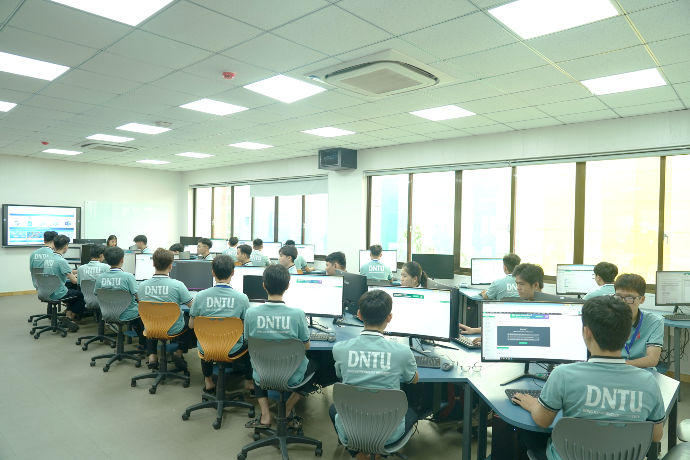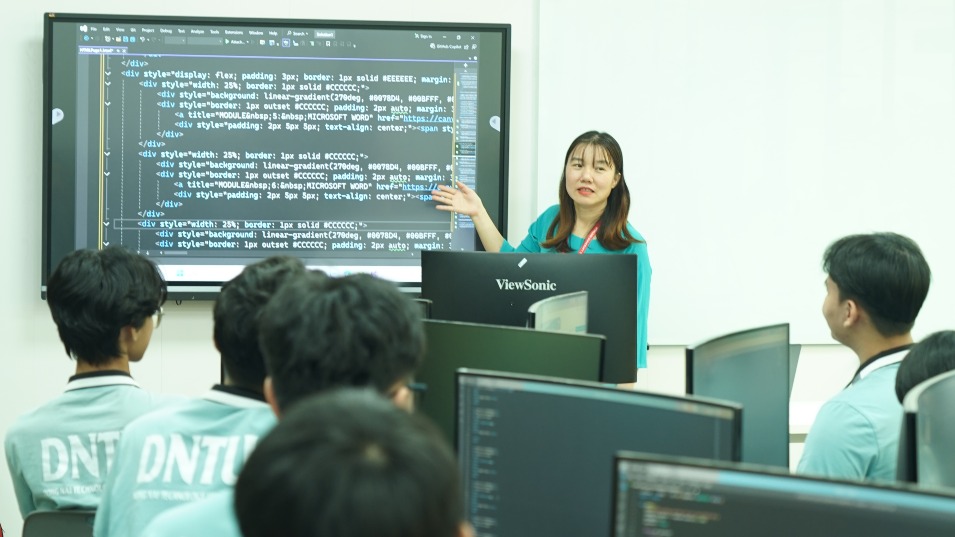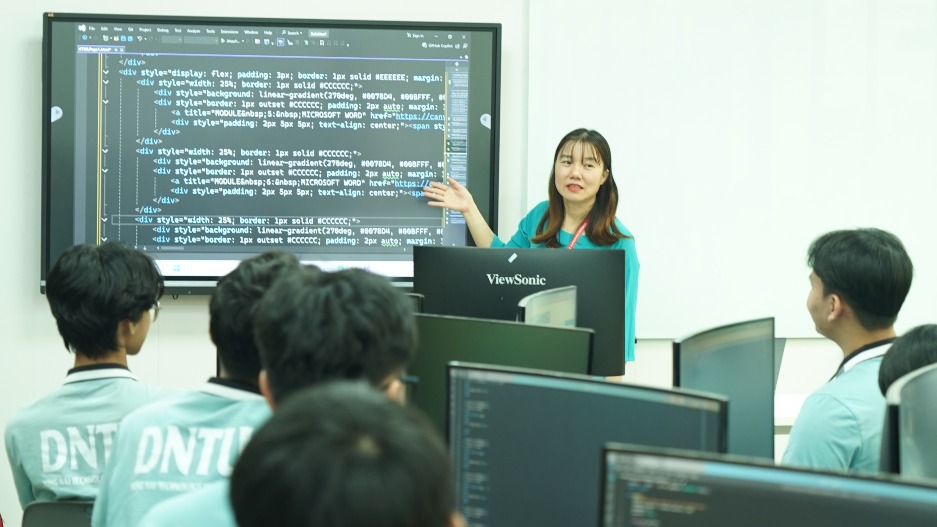The Software Engineering program emphasizes software development methods, practical programming, and project management. Students learn to design and implement innovative software solutions for various applications.
Major code
7480103
Enrollment combination
A00: Math, Physics, Chemistry
D01: Math, Literature, English
A01: Math, Physics, English
D15: Literature, Geography, English
Academic years
4 yearsDegree
Bachelor

Students work directly with software companies, participating in simulated or commissioned projects, helping them master software development and management processes.
A combination of theoretical lectures, group discussions, hands-on practice in high-tech labs, and real-world assignments from enterprises.
Includes theoretical exams, skill evaluations through software products, and feedback from corporate partners on students’ workplace competencies.

CB70303: Public Speaking Skills (1 credit)
PM70201: Introduction to Software Engineering (1 credit)
TH70103: General Informatics (2 credits)
CB70101: Marxist-Leninist Philosophy (3 credits)
CB70104: Ho Chi Minh Ideology (2 credits)
CB70202: Advanced Mathematics (3 credits)
TA70305: Intensive English 1 (4 credits)
CB70304: Emotional Management Skills (1 credit)
TH70104: Computer Architecture (2 credits)
TH70105: Programming Fundamentals (3 credits)
PM71201: Application Graphics (2 credits)
PM71202: Computer Networks and Network Services (2 credits)
CB70102: Political Economy of Marxism-Leninism (2 credits)
CB70106: General Law (2 credits)
TH70101: Discrete Mathematics for IT (3 credits)
CB70206: Scientific Research Methodology (3 credits)
CB71101: Environment and Sustainable Development (2 credits)
CB71102: Behavioral Psychology (2 credits)
CB71103: Medical Ethics Psychology (2 credits)
TA70306: Intensive English 2 (4 credits)
CB70305: Communication and Relationship Building Skills (2 credits)
PM70202: Programming Techniques (3 credits)
PM70203: Database Systems (3 credits)
CB70103: Scientific Socialism (2 credits)
CB71104: Green Economy and Sustainable Development (2 credits)
CB71105: Vietnamese Traditional Music and Culture (2 credits)
CB71106: World Civilization History (2 credits)
TA70307: Intensive English 3 (4 credits)
CB70307: Industrial Safety Skills (2 credits)
PM70204: Web Design (3 credits)
TH70107: Data Structures and Algorithms (3 credits)
PM71203: Basic Python Programming (3 credits)
PM71204: Windows Programming (3 credits)
CB70105: History of the Communist Party of Vietnam (2 credits)
TA70308: Intensive English 4 (4 credits)
PM70205: Object-Oriented Programming (3 credits)
TH70108: Database Management Systems (3 credits)
PM71205: Advanced Python Programming (3 credits)
PM71206: .NET Technology (3 credits)
PM70206: Mobile Application Development (3 credits)
PM70207: Web Application Development (3 credits)
TH70109: Information System Analysis and Design (3 credits)
PM70208: Introduction to Artificial Intelligence (2 credits)
PM70209: Introduction to Software Technology (2 credits)
TH71114: E-Commerce (3 credits)
PM71207: Open-Source Software Development (3 credits)
PM71208: Machine Learning and Data Mining (3 credits)
PM70210: Information Security (3 credits)
PM70211: Software Architecture and Design (3 credits)
PM70212: Software Testing and Quality Assurance (2 credits)
PM70213: Software Project Management (2 credits)
PM70214: Technical English (2 credits)
TH71123: IoT Technology and Applications (3 credits)
TH71118: Blockchain Technology (3 credits)
TH71111: Computer Vision (3 credits)
TH71108: Web API (3 credits)
PM70215: Internship (8 credits)
PM71209: Graduation Thesis (8 credits)
PM71210: Artificial Intelligence with Python (4 credits)
PM71211: Software Development (4 credits)
After graduation, students can take on the following job positions:

For over two decades, Dong Nai Technology University (DNTU) has grown and developed with the steadfast belief that "Talented and virtuous individuals are the vital essence of a nation.". Our mission is to educate high-quality human resources through technology-based training and experiential learning. We are dedicated to conducting applied research and transferring knowledge to meet societal needs, embrace international integration, and foster sustainable development. DNTU takes pride in cultivating digital citizens who are prepared to embrace the future with confidence.